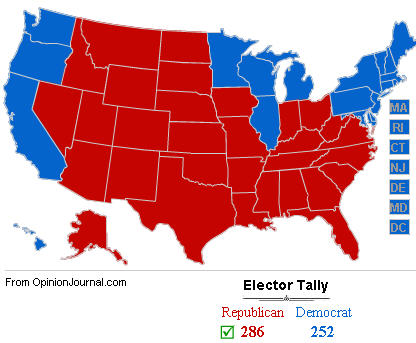Bush 286, Kerry 252: Analysis
It turns out that my Monday prediction on the presidential race was exactly right, with Bush garnering 286 Electoral votes and carrying every 2000 Red state except New Hampshire and adding New Mexico and Iowa from the 2000 Blue states.

It was my best, conservative guess of how the election would come out but not one that I had enormous confidence in. With so many races polling so close, an educated guess is still just a guess.
I am pleased to have been wrong on my popular vote prediction of Bush 49%, Kerry 48%, and Nader 1%. Instead, Bush won a 51-48 majority and a margin of over 3.5 million votes nationally.
While the networks have been reluctant to call the race and the Kerry camp is refusing to concede, the fears that we’ll have a repeat of 2000 are almost certainly unfounded. My strong suspicion is that Kerry will give it up some time today. While there were predictions that Ohio would be the Florida of 2004, that won’t happen because of several key differences.
 The margin:
The margin:
Bush was only ahead by 200 or so votes after the first count in Florida, a bigger state than Ohio. Bush currently leads by nearly 150,000 votes with all precincts in. The math is incredibly improbable for Kerry–virtually all of the provisional ballots would have to be ruled valid and they would have to go almost exclusively to Kerry. Both are rather unlikely.
Perhaps more importantly, there was a built in excuse in Florida in that the Butterfly Ballots, Hanging Chads, and other oddities actually created a plausible argument that, had these things not occured, Gore would have carried the state. Under that circumstance, trying to overturn a razor thin margin was acceptable.
Moreover, the sheer size of the initial count–with 100% of the precincts reported–creates a psychological victory for Bush in Ohio in a way that he never had in Florida in 2000. Kerry trying to overturn this result would be outrageous in a way that it never was in Florida.
 The national popular vote: In 2000, Gore had a 500,000 plus plurality in the overall vote. While that doesn’t strictly matter in our system for a variety of reasons I’ve written about ad nauseum in this space, it did give his attempt to overturn a tight election result in Florida more legitimacy. More Americans, after all, had voted for Gore than for Bush. That meant that 1) more people would have been happy with an overturn of the result than would have been angered by it and 2) even people who voted for Bush had some initial sympathy for his cause.
The national popular vote: In 2000, Gore had a 500,000 plus plurality in the overall vote. While that doesn’t strictly matter in our system for a variety of reasons I’ve written about ad nauseum in this space, it did give his attempt to overturn a tight election result in Florida more legitimacy. More Americans, after all, had voted for Gore than for Bush. That meant that 1) more people would have been happy with an overturn of the result than would have been angered by it and 2) even people who voted for Bush had some initial sympathy for his cause.
Given that Bush has a national margin roughly six times that enjoyed by Gore–and even won a national majority–the Ohio result has even more credibility. The majority of Americans would almost certainly be outraged by any attempt to change the outcome of the election under these circumstances. Not only does that put pressure on both the Kerry camp and the judiciary to resolve this quickly, but it virtually assures that Kerry could never be seen as a legitimate president.
The Nader factor: Gore had the additional argument in 2000 that more Floridians prefered him to Bush in 2000 but some of his vote was siphoned off by Ralph Nader. No such excuse exists this time: Nader wasn’t even on the ballot in Ohio. Indeed, even if we make the odd presumption that those who voted for the minor party candidates in Ohio all preferred Kerry to Bush and thus added their totals to his, Kerry still comes up short.
John Edwards: Edwards clearly wants to be the main alternative to Hillary Clinton in 2008. He has to realize that 2004 is a lost cause and that a divisive effort to overturn the election would pretty much kill off his chances for the future.
We’ve already had one 2000: The fact that we went through this in 2000 mitigates against a repeat. People remember how bitter and agonizing it was last time and have no desire to do it again.



Dr. Joyner, thanks for your fine punditry throughout the election season. I particularly enjoyed watching your reaction to the SwiftVets evolve from August to now; it paralleled what I believe took place among a sizeable chunk of the open-minded public over the same period of time.